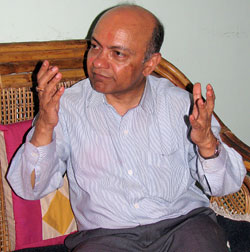|
|
Kul Chandra Gautam went home to Amarpur to a hero's welcome. The UN Assistant Secretary-General had not been back to his Gulmi village for almost six years. His village is proud of him, and he of it. Gautam says that despite the turmoil of recent years, many changes he sees are positive.
We accompanied Gautam home, and talked with him later at a relative's house in Butwal. He was emotional as he told us that everyone he met had the same courteous, kind, loveable and neighbourly qualities he grew accustomed to as a child, over 55 years ago. "It's amazing how people continue to be warm, caring and cordial after all these years of hard life and living in conflict," said Gautam, perched atop a modest wooden chair, his legs comfortably crossed.
He's sanguine about the passing of time, but will admit to some nostalgia and a sense of loss. "So many people I knew have died or left the villages," he says. But Gautam also sees real progress. There is now a water supply near the village, a telephone line, a motorable road, schools, a post office, a health post, and other basic development, which was undreamt of when he was younger. There's still no electricity, though, and Gautam laughs, "My god, I never realised how pitch dark it gets, like in the ancient times."
Still, comparisons with his childhood aside, Gautam knows that though the changes seem big, there remains much to be done in his village, as in most of rural Nepal. He noted that the VDC office was still not functional and that rural development activities were still in slowdown mode, people are still extorted and live in fear of the local Maoist cadres.
Good and bad, it's all a far cry from his childhood. Gautam remembers the slow, bucolic life that was gently interrupted when he was seven and, obeying his grandfather's wishes, left home for a village across the river to study Hindu scriptures and Sanskrit to become a priest. The young Gautam's life would have taken a different direction if his uncle had not persuaded him that a modern education in Kathmandu, and not a theological one in Banaras, was the way ahead. Poor health made that difficult, so he studied instead at Janata Vidyalaya High School in Tansen.
The young scholar used his time in Tansen well, getting through the canon of Nepali literature by 16, being appointed Palpa's poet laureate, and only then going to Kathmandu to pursue a passport-his Peace Corps friends had encouraged Gautam to go study in the US. The passport was some time coming, and in the meantime he turned down a scholarship to Dartmouth to study at Tri-Chandra College from where, not surprisingly, he topped the national IA diploma.
Two years later, he got his passport and the rest is relatively well-known-a master's in public affairs from Princeton's Woodrow Wilson School, and a career that started in war-torn Cambodia, followed by a memorable stint in Laos as the youngest UNICEF country representative, a tour of duty in ravaged Haiti, and envisaging the 1990 UNICEF Declaration and Plan of Action, one of the most effective instruments for international advocacy and action for children's well being.
Kul Chandra Gautam is something of a role model for Nepalis, but he just says modestly, "Sometimes, I pinch myself, because I can't believe what people say about me." He honestly believes that anyone can reach to the top. "I see the silver lining behind every dark cloud," smiles Gautam.
Back home too, he sees the upside, but is realistic about the future of the country. While in his village, naturally Gautam's opinions on the conflict and on politics was canvassed constantly. As a senior UN official Gautam may not speak much about the conflict here, and he was at pains to emphasise that anything he said was his own personal view, and not that of his organisation.
As a citizen, he said he felt strongly that the Maoists should stop talk of arms management by the parties and the international community being part of a conspiracy against them. "I can tell you after being in the villages that arms management is a real issue from the point of view of ordinary Nepalis," he says passionately.
Gautam retires from UN next year, after 33 years and is enthusiastic to return to Nepal and help in the reconstruction process. Will he join a party or accept a post in government? Emphatically not, says Gautam-he wants to work in his personal capacity and in voluntary endeavours.
He tells us almost shyly that he is also excited about coming back and returning to his lifelong passion, Nepali literature. As a student at JP High School and Amrit Campus in Kathmandu, Gautam couldn't afford to buy books or the daily paper. So, rain or shine, he'd walk everyday to Bhugol Park in New Road to read the newspapers pasted on the wall. He'd do it again if he had to.
"Never forget where you come from and don't let success go to your head," says the man who still calls himself a village boy from Gulmi. "That's the only way to keep your humility and remain realistic. Those are the things that have been useful in my life. have been useful in my life"



